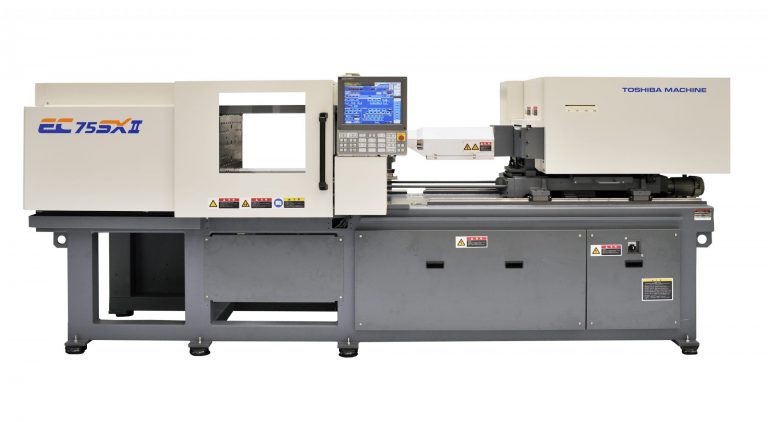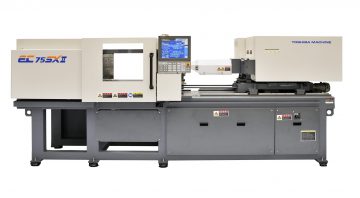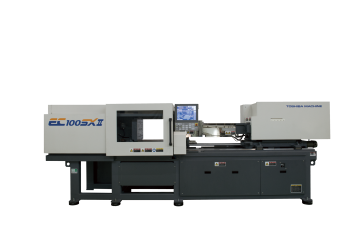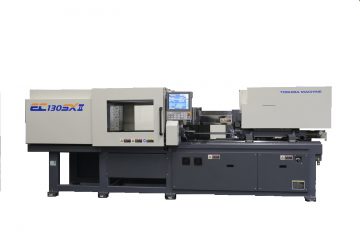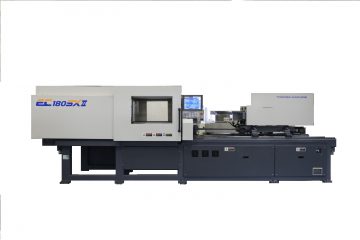Machine spec. 500-3.500 kN
Shibaura Machine offers 8 different clamping forces in the range up to 3.500 kN. Each version comes with matching panel dimensions and injection units. Every injection unit will fit 3 screw diameters.
Listed below are the various smaller models by Shibaura Machine (formerly known as Toshiba) available. If you have any questions or are having trouble finding specific information, please do not hesitate to contact us. We will be more than happy to assist. *Actual product appearance may vary.
Contact usBenefits
On average, the energy consumption of a fully electric Shibaura Machine (formerly known as Toshiba Machine), is approximately 25-30% of that of a conventional hydraulic injection moulding machine. Frequently, however, energy savings can add up to over 70%.
It is not until 4,500 KN that hydraulic oil is present to drive the injection carriage, which makes the machines low in maintenance and prevents hydraulic leaks.
Due to the extremely high repeatability, production processes can be set closer to the critical boundaries of the product. This frequently results in products which have no flash, meaning that certain products which are impossible or extremely difficult to process with a hydraulic machine, can easily be produced with a Shibaura machine.
Because the machines use their electric energy so efficiently, no water-cooling is required on motors or control-boxes. Water-cooled circuits carry the risk of corrosion to the cooling system, which can lead to leaks and additional costs to replace these components. The lack of cooling water erases these risks, and creates a cleaner production environment.
The machines produce very little noise, which means the overall sound levels are incredibly low.
To summarise, fully electric machines result in:
- average electricity savings between 50-84%, when compared to existing hydraulic machines.
- savings on cooling energy due to the lack of oil and water-cooling of the motors.
- savings on the transformer capacity and powerlines in your factory due to the low energy consumption and power connection.
- savings on maintenance costs.
Field data
From our experience in the past few years, we have seen that when Shibaura machines were used in the production of fast and of slow products:
- the maintenance costs in the first 10 years (which include grease for the toggle system and ball screws) come to an average of €250 to €450 per annum. These machines were all producing 24/7, at the time of polling.
- the usability in terms of the actual number of production hours per month, is 15-20% higher. With 2 shifts working from 06:00 to 22:00, we have seen that the actual number of production hours using standard hydraulic machines comes to an average of 520 hours per month. When measured for five Shibaura machines, ranging from 160 to 220 ton, the amount of actual production hours comes to 590 per month.
The main factors for this are consistent dosing and injection, more consistent ejection movement and a perfect opening stroke with a position accuracy of 0.05mm, which all contribute to a lower number of production stops.
Numeric example of energy consumption of a Shibaura machine (formerly known as Toshiba)
As we have currently installed multiple Shibaura 350 ton machines with our clients, we are able to provide an energy consumption rate expressed in Kilogram per Hour. The average consumption rate is 0.33 kW per kg/hour. The lid for a bucket produced on a 350 ton machine weighs 400 gram in a 17 second cycle. The total consumption of plastics therefore comes to around 85kg. The energy consumption will add up to a maximum of 85kg X 0.33 kW = 28 kW/hour. The energy consumption of a standard hydraulic machine ranges from 0.86 to 1.3 kW per kg/hour, depending on the type of machine. In this example, that would add up to an energy consumption of 73 to 110 kW/hour.
The minimum energy savings when compared to a standard hydraulic machine would in this case be 45 to 82 kW/hour, which is a 60-75% reduction.

